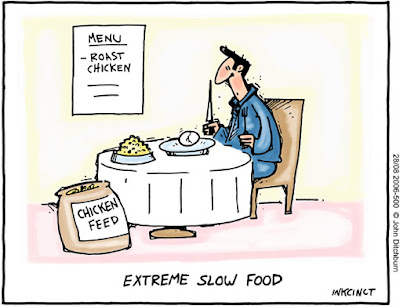what the heck is slow food, anyway?

Several people have asked me this question lately. For those who have not heard the term before, 'Slow Food' seems to conjure up images of crock pots simmering soups and stews at about the same speed paint drys. Here is the simple answer:
"Everyone has a universal right to food that is good (tastes delicious), clean (was sustainably grown) and fair (those who produce it are sustained as well, and that people from every community can enjoy it)."
San Francisco Chronicle Arts and Culture Critic Steven Winn explained it in far more detail (Putting Key Issues on the Menu-August 29): ”As both Slow Food disciples and outside observers see it, the growing international movement’s underlying principles have implications that reach far beyond the dining rooms of the fad-chasing upper middle class. In its rebuke of fast food, agribusiness and global distribution and its embrace of local products, biological diversity and the sensual delights of the table, food is a touchstone for everything from energy policy and net-roots politics to the ways Americans both seek and sabotage pleasure…..The Slow Food mind-set fosters local communities of people with shared interests…..Ideally, it summons people back to the table awakened to the power of personal choice across a broad spectrum of issues.”
Perhaps Slow Food Nation Executive Director Anya Fernald said it best: “This is all about a response to industrialization and a reclaiming of what feeds and nourishes us. It's a push back against a global system bent on the commodification of everything.”
Though, admittedly, there is certainly an annoying, elitist segment within the movement. While I was sipping at the wine bar during last Sunday’s Taste Pavillions at Fort Mason, I overheard a man behind me remark to his friend “Not much of a red selection”. (There were 454 American made wines available to taste, 259 of them being red) I turned to face them, somehow managing to curb my strong impulse to bitch slap him for his pretentious arrogance, instead asking “compared to what?” His (seemingly embarrassed) friend mumbled in response “France, maybe?”…..
My own definition of Slow Food reaches far beyond the subject of food itself, as I see its objectives as being both broad and inclusive. SF's principles affect many of the choices I make in my own daily life.....doing my best to avoid riding the consumer train means working less, spending less and living more (creatively). I also believe passionately in the importance of teaching our children values that respect our food systems, our health and our environment. I am truly convinced that Edible Education, in combination with other like-minded programs, could quite literally become a key contributor to saving our planet.






No comments:
Post a Comment